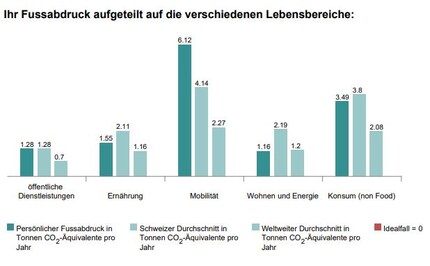
Opinion
LEGO and sustainability: real change or just greenwashing?
by Ramon Schneider

Since June, customers have been able to shop climate neutrally at digitec Galaxus. Some, however, want to offset their entire carbon footprint. This is now possible with the purchase of CO2 certificates. Affordable and sensible – even for animal lovers.
Even if the Covid 19 virus has temporarily pushed climate change out of the headlines, global warming remains arguably the greatest challenge of the 21st century. A growing part of the Swiss population is now also convinced of this. There's no question: our lifestyles will decide whether our grandchildren will still know the Aletsch Glacier from seeing it in person or only from their history books. Accordingly, more and more citizens are asking themselves: how can I, an ordinary consumer, protect the environment without completely changing my lifestyle?
Our country's climate protection ambitions have long been settled. To achieve the climate targets agreed under the Paris Climate Agreement, Switzerland has committed to halving its per capita CO2 emissions by 2030 and even reducing them to net zero by 2050. Sporting specifications that cry out for action. Let's start with the status quo. According to the Swiss Federal Statistics Office, the average CO2 footprint of the average Swiss citizen is currently 13.5 tons per year. By 2030 – in the next 9 years, mind you – we must save 7 tons of Co2 per capita. How this could be achieved can be determined free of charge in three minutes using WWF's footprint calculator. But be careful: looking at your personal climate footprint, including reduction tips, can lead to stress.

Let’s start with the good news: if you want to halve your climate footprint by 2030, you don't have to move to a monastery, but first and foremost rethink your mobility. If unnecessary long-distance flights, cruises and pointless highway kilometres are excluded from your life, your CO2 footprint already drops considerably. For example, if you move your surfing vacation from Bali to Biarritz and travel by train to the French Atlantic coast, you reduce your annual carbon footprint by more than five tons, or an average of 37 per cent. Switching from cars to public transport is also extremely effective, if possible. Swapping a gas guzzler for an SBB General Abonnement or, alternatively, switching to a modern electric car can cut CO2 emissions by a further 20 to 35 per cent.
Beyond mobility, CO2 reduction is becoming significantly more challenging. And as the targeted reduction of greenhouse gases when purchasing public services, housing and food is rather difficult, the consumption of non-food products inevitably comes into focus. And that brings us to the painful issues – hobbies or beloved pets. A recently published study shows with frightening clarity that my mother's two fun-loving Border Collies weigh heavily on her climate balance. The two sociable four-legged friends emit more than two tons of CO2 per year – including food, housing, transport and other purchases. Converted to a highway route with my French family car, this would be about 10,000 kilometres per year.
Biarritz is fine with me. My car mostly just sits around anyway, and I don't need twelve pairs of sneakers. But having to consistently do without dogs, a ski weekend with the kids or other nice things in life, that would be really hard. But it's not all bad news. In addition to reducing your personal carbon footprint, there's another way to protect the climate, at least temporarily – CO2 compensation. As a short- to medium-term tool, it's effective and useful. The funds flow into selected climate protection projects by means of CO2 certificates, which reduce greenhouse gas emissions cost effectively and in the long term. Often in regions of the world where the financial resources for climate protection are lacking.
By the way: According to the Federal Statistical Office, a family of four emits around 50 tons of CO2 per year. With a CO2 compensation price of 30 francs per ton, this reaches 1500 francs per household – or about as much as a direct flight from Zurich to the distant surfing Mecca of Bali (pre-Covid).
Here's a link to some projects whose CO2 certificates are available in the store as of now:
Prony Wind Power
Siam Solar
Lacondon Forests for Life
Xe Namnoy Hydropower
Making sure employees and media know what's up at Digitec Galaxus is my job. But without fresh air and a lot of exercise, I basically stop functioning. The great outdoors provides me with the energy I need to stay on the ball. Jazz gives me the tranquility to tame my kids.
This is a subjective opinion of the editorial team. It doesn't necessarily reflect the position of the company.
Show all